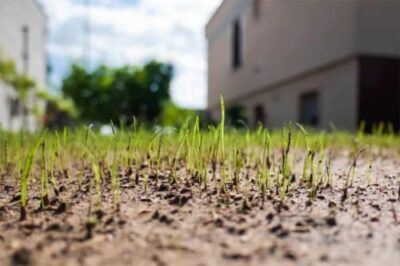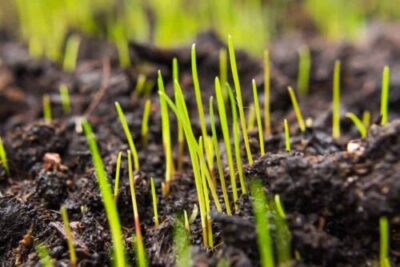Can you overwater grass seed? Yes, you can overwater grass seed and the consequences are severe.
Disclosure: This article may contain affiliate links – that means we may receive a commission if you make a purchase after clicking on these links. This is at no extra cost to you.
Overwatering grass seed is a common mistake that many inexperienced gardeners often make. However, it’s easily avoidable once you’ve learned about watering grass the right way, and how to overcome some of the biggest challenges.
Generally, if puddles form when you water your grass or the soil becomes soggy and waterlogged, then it’s likely that you’re overwatering and hurting your new grass.
This guide will take a look at some of the common problems that can occur when you overwater your grass seed, as well as the best methods of recognizing and preventing it.
What Are The Main Problems Of Overwatering?
While all new grass requires a fair amount of water to grow and establish deep, healthy roots, too much water can cause a number of problems which end up inadvertently harming your grass.
Washing Away Seeds
If too much water is applied to grass seed, it’ll pool on the ground before getting absorbed into the soil. This allows the seeds that aren’t anchored by roots to float and wash away, resulting in more bare spots and increased clumping.
If your garden is on a slope, this problem is only enhanced as the water run-off will carry your seeds downhill and potentially far away from your yard.
It’s worth noting that newly sprouted seedlings can also get washed away by excessive water as their roots may not be strong enough to anchor them in place.
Poor Germination Rates
Another common problem of overwatering your grass is the possibility of covering the seed up with excess mud. This can have a detrimental effect on the germination rate of your grass, slowing or stopping its growth from a seed.
Fungal Issues
Moist conditions are ideal for fungi to flourish. So, overwatering your grass can lead to fungal growth that damages not only new grass, but also established grass.
This damage is particularly devastating for grass seeds that haven’t yet sprouted or properly established themselves. This is because the fungus growing around the seeds can often cause them to break down and decompose.
Burying Seeds
As well as displacing the seeds, too much water can also shift the soil. Once the water is absorbed by the ground, the redistributed soil will move elsewhere.
This can bury grass seeds and newly sprouted grass, cutting them off from any direct sunlight, and subsequently halting their growth.
Signs Of Overwatering
One of the best methods of checking whether you’re overwatering your grass seed or not is to keep a close eye out for pooling water.
Pooling water means that the ground under the seeds may be either waterlogged or compacted, resulting in the small area on top getting soggy. This can cause your grass seed to float, clump together, or rot if waterlogged regularly.

Another sign of overwatering is a noticeable growth of weeds. While too much water isn’t ideal for growing healthy grass, it provides excellent conditions for weeds to thrive.
So, if your grass suffers with a sudden outbreak of weeds, it’s probably best to ease off a little with the watering.
How Often Should I Water My Grass Seed?
Grass seed, like most types of seed, needs to stay moist almost constantly in order to germinate. Watering should be divided across a couple of sessions per day, lasting a couple of minutes at a time so the soil becomes moist (roughly to a depth of 1”), but not saturated. Using a sprinkler can help to distribute water evenly.
Needless to say, external and environmental factors will have a large influence on the frequency of your watering.
You can increase your watering frequency based on the rate at which the soil dries out while the grass grows. It’s worth remembering that once the grass reaches around 4” in height and is established enough to be mowed, you can safely stop the frequent watering after the second mowing.
Can You Under Water Grass Seed?
If you’re too cautious with watering your grass seed in an attempt not to overwater it, you’ll likely end up watering it too little. This will dry your grass seed up and deprive it of the nutrients it needs to survive.
Underwatering your grass seed is equally as harmful as overwatering, and can quickly kill off the seed.
Therefore, it’s absolutely essential to closely monitor the amount of water you’re using if you want them to grow and become healthy.


